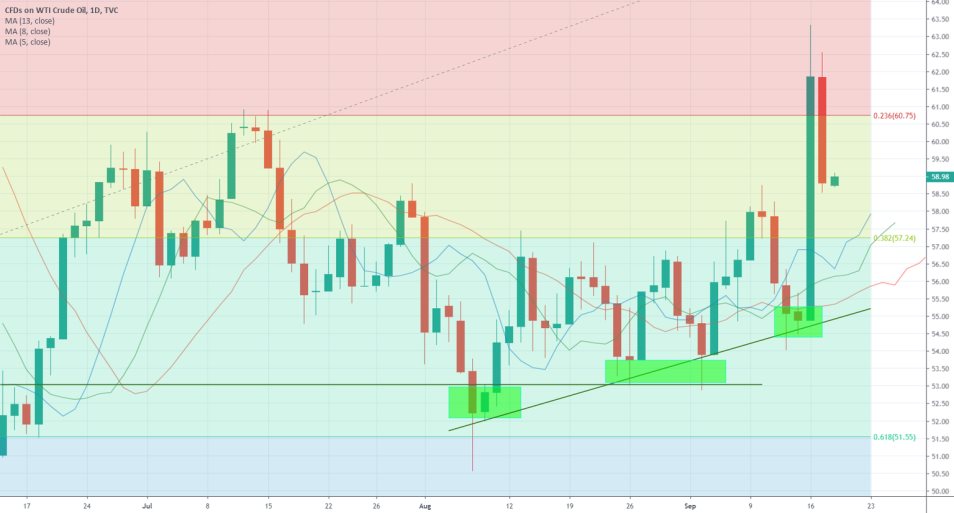
The price of the crude oil managed to partially offset the massive jump of 7 dollars per barrel that was registered on Monday, following the alleged drone strikes by Yemeni rebels on Saudi Arabian oil facilities, which attribute to 5 per cent of the global output of the commodity. The price fell almost 3 dollars per barrel during Tuesday's trading session following the statement of Saudi Aramco’s Chief Executive Amin Naser claiming that Saudi Arabia is working towards restoring the production output to previous levels, that were generated before the attacks took place, by the end of September.
The tumble of the prices yesterday did not surprise investors, as the market expected the Saudi kingdom to use its massive oil reserves to fulfil its commitments to all of its clients this month. As you may recall from this week's opinion-piece that covered Saturday’s attacks in details, and outlined the likely ramifications for the oil market as a whole, the sudden surge in the price was unlikely to persist in the long-term.
Saudi Arabia’s Energy Minister Prince Abdulaziz bin Salman was cited by Reuters during a press statement in the city of Jeddah, as saying:
“Over the past two days we have contained the damage and restored more than half of the production that was down as a result of the terrorist attack. […] Oil supplies will be returned to the market as they were before 3:43 a.m. Saturday” [source]
Thus, the oil market can temporarily relax as the suddenly created disequilibrium on Monday will most likely disappear soon. Yet the danger of a political crisis in the Arabian Gulf region is still present, as US officials released new evidence on Monday demonstrating the sophistication of the attacks. In doing so, Trump's administration further alleged Iran for being the primary culprit of the drone strikes, despite the Houthi's claim of responsibility.
In our article from Sunday, it was further argued that the long-term consequences for the oil market depend on how the political situation is handled. If the spat between Washington and Teheran is to escalate, the newly created uncertainty for the future in the region is likely to result in permanent, heightened volatility in the oil prices. Presently the price of the WTI Crude Oil is trading at 59.00.

Trendsharks Premium
Gold is undergoing a correction, as investors take profits to offset losses from falling stock prices, impacting their margins. However, we anticipate a renewed wave of [...]
The Swiss stock market index is mirroring its global counterparts, such as Germany 40 and US100, experiencing a sharp decline following the announcement of new [...]
We’re analyzing the weekly chart to grasp the broader market trend. Over the past three years, the US30 index has surged by 17,000 points, often resembling a nearly straight [...]
Over the past week, the DAX has experienced a sharp decline, plunging by an astonishing 3,400 points. This downward movement is not isolated, as its international counterparts, such as the UK100 and US100, are also facing significant [...]
EURUSD recently formed a double top at 1.0930, signaling a potential trend reversal, and has since begun a correction. After a 600-pip rally since early March, a pullback at this stage is both expected and healthy. Given these conditions, we are placing a [...]
Since early March, EURJPY has surged nearly 1,000 pips, providing us with several excellent trading opportunities. However, as the rally matures, many early buyers are beginning to take profits, leading to a noticeable slowdown in the uptrend. On Friday, the pair formed a [...]
The AUDJPY currency pair continues to be dominated by bullish momentum, as multiple golden cross patterns reaffirm the strength of the ongoing uptrend. Despite this, we are witnessing a much-needed [...]
The EURAUD currency pair appears to be undergoing a trend reversal, signaling a potential shift in market direction. A notable technical development is the formation of a Death Cross on the chart, a widely recognized bearish indicator that typically suggests a [...]
After securing an impressive 200-pip profit last week, the EURJPY currency pair is now undergoing a southward correction, retracing some of its recent gains. Despite this temporary pullback, the Golden Cross remains intact, reinforcing our view that the overall trend continues to be [...]
The appearance of a Golden Cross in Silver strengthens our analysis that the metal is currently in a strong uptrend, indicating further bullish momentum in the market. This technical pattern, where the short-term moving average crosses above the [...]
This trade presents a considerable level of risk and can be classified as an opportunistic move based on recent price action. The GBPUSD currency pair has experienced a substantial bullish rally, surging by nearly 500 pips in a strong upward movement. However, after this extended period of appreciation, the pair is showing signs of a potential [...]
The anticipated Death Cross on the SMI20 appears to be failing as price finds strong support at the 23% Fibonacci retracement level. After testing this area, the index has shown bullish strength, printing several large green candles, signaling an increase in [...]
A Golden Cross has just appeared on the USDJPY chart, signaling a potential bullish move. This technical pattern occurs when the 20 period moving average crosses above the 60 period moving average, a widely recognized indication of increasing [...]
After 2 months of a down trend, we finally see some indications of price recovery for Oil. The golden cross, a historic buy signal, supports this [...]
For the past month, the German DAX40 has experienced a remarkable 10% surge, reflecting strong bullish momentum. Despite ongoing market volatility and frequent pullbacks, every dip continues to attract fresh buyers, reinforcing the [...]
Oil continues its downward trajectory, despite occasional pullbacks. The overall trend remains bearish, reinforced by multiple Death Cross patterns, a classic sell signal indicating further weakness. Adding to this bearish outlook, the critical [...]
Over the past few days, gold has experienced a sharp decline of more than $100. This downturn can be attributed in part to traders securing profits to manage their margins, which are under strain due to the significant drop in major indices. Currently, gold has fallen below the [...]
The NASDAQ 100 index is showing strong bullish momentum, as evidenced by the formation of a Golden Cross on the chart. This classic buy signal occurs when the short moving average crosses above the long term moving average, suggesting that upward momentum is [...]
The EURAUD currency pair has encountered a significant resistance level, failing to break above the critical 61% Fibonacci retracement level. This suggests that bullish momentum is weakening, reinforcing the case for a potential downward move. Given this technical setup, we favor entering a [...]
The UK100 is experiencing a remarkable rally! Over the past few weeks, the British stock market index has surged nearly 800 points. Each minor dip has attracted more buyers, fueling the bullish momentum. However, since last week, we’ve observed a slight [...]




















